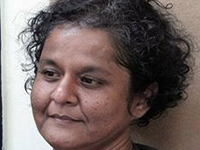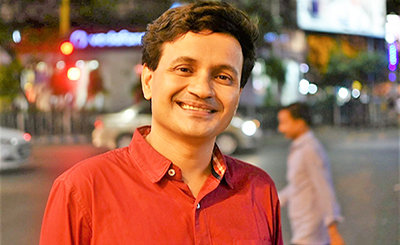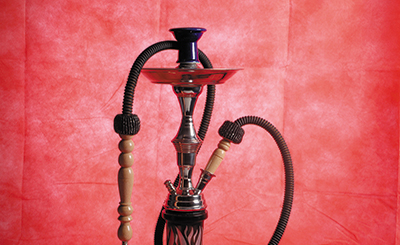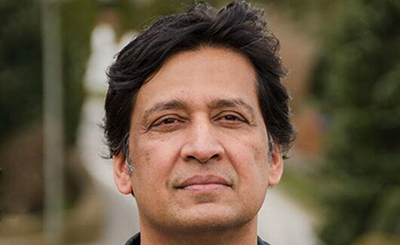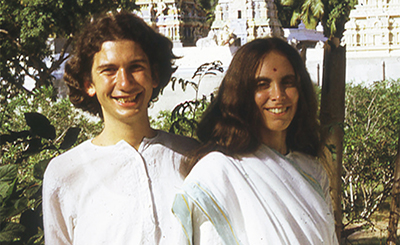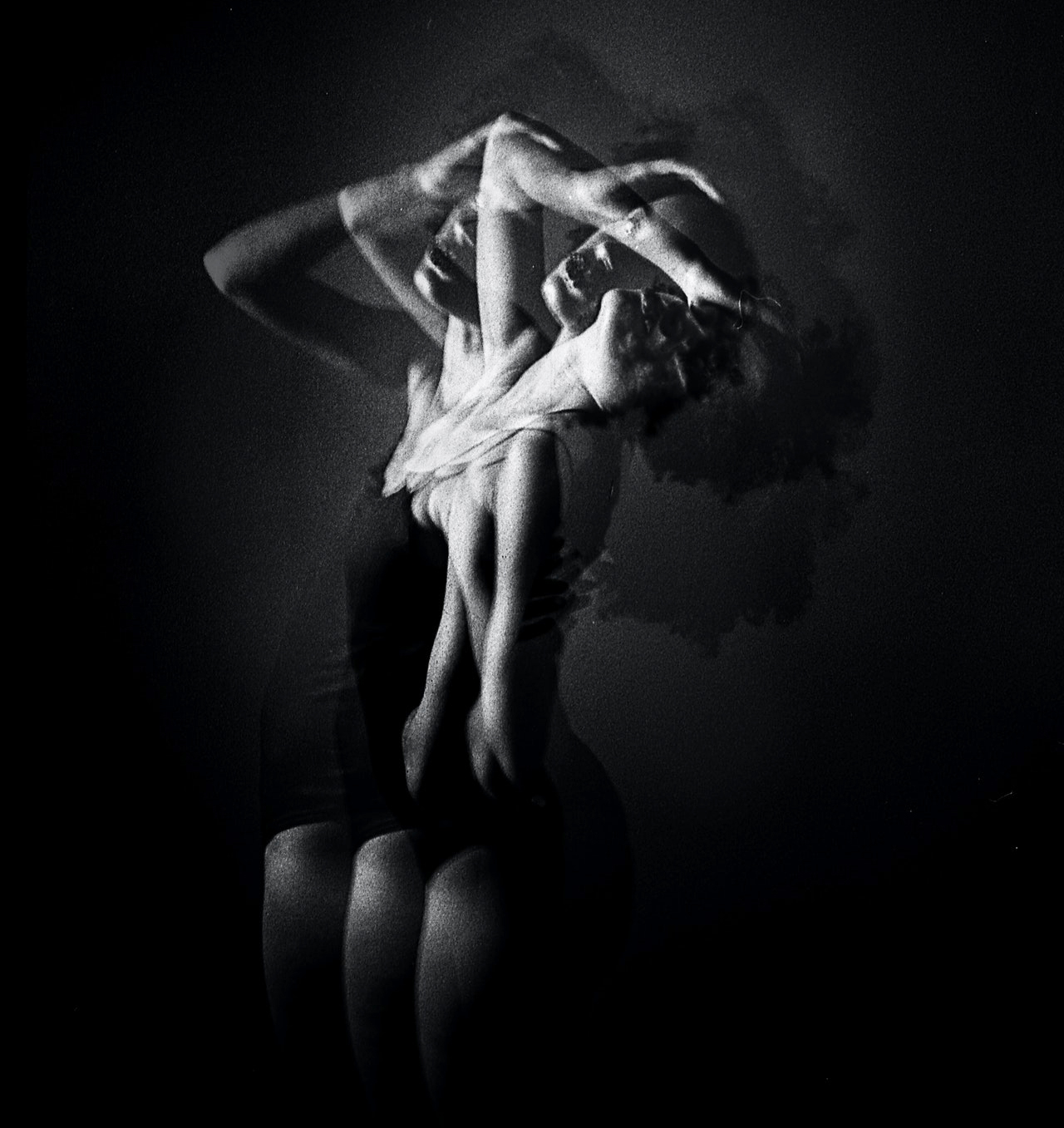
I hope my virginity has fetched you a good price. “Let her bloom a little more. She will fetch a higher price.” You had hoped.
Much higher than what you had paid when you bought me.
*
You turn away, I climb into my buyer’s truck, and the village bursts into a hundred lights to bid me goodbye, and a band breaks into its parody of a Bollywood song.
Aaj main upar, Aasmaan neeche — I am so happy, even the sky is below me, I am on top of the world.
I look down at the baraat for which the music was playing, the lights were shining.
I have always envied the pre-wedding girls — the soubhagya kaankshinis — girls desirous of good fortune. I envied their bodies, over the chastity of which, communities rioted.
Once I even envied a victim of honour killing; her intactness so important to someone.
Most of all, I envied the way the mothers wailed at the Bidaai.
The sending away, when the bride threw rice over her head without looking back, and her sobbing mother caught it in her saree padar.
I would have seen the trousseau a week before — five sarees, five sets of clothes for regular wear, talcum powder, even sanitary napkins (“In her new home, she will be too shy to ask someone to buy sanitary napkins for her”).
Maternal love in a brand new suitcase. To send the daughter away with love.
I am going ahead, my world is left behind — Aaj main aaage, Zamaana hain peechche — the song faded away as the truck picked up speed.
I was being sent away. Again. By yet another mother.
The first one, my birth mother, had sold me for a few Rupees that would feed the rest for some time. Now you have sold me.
*
Vinod, my buyer, tries to fill the new silence with the radio news. A ruling party MLA member of the state legislative assembly is promising his men, fair brides from the hills.
The new law is a matter of great sahuliyat for you, he says.
He does not say khushi, which would have meant happiness or joy. With an astuteness that goes against his uneducated, crude self, he chooses precisely.
He says sahuliyat, which means convenience.
The hill state has been stripped off its special powers, which were not so special at all, but just called special, because none of the other states had been allowed to keep their own identity. The state had joined the larger us under this condition that it be allowed its sovereignty, and now that had been taken away. It was a matter of land, land, land, I knew because is that not what men fight over?
Land and the bodies of women — the right to plough, dig, plant seeds in, to own.
This politician knew that, and he wanted his men to forget that they were unemployed, that they had no food, no basic health amenities, so he promised them fair brides from the hills. If a fair bride could be bought, why would anyone continue with the present practice of importing brides from my state — Jharkhand?
As much as I hated her, I thought of the poor women like my birth mother — would they lose even this source of income?
Why this import of brides? Posters nailed to trees say that this state has only 830 girls for every 1,000 boys. In most Indian communities, the boy child is coveted, the girl child is unwanted.
I have been imported however, in the only community where girl children are celebrated, coveted, are of benefit.
In contrast to my best friend Resham, who is underfed, I am the calf that is being fattened.
Resham had been allowed to live, in spite of being a girl, because she was the first-born; the first-born girl was auspicious, was considered an avatar of Lakshmi, the goddess of wealth.
But when two girls followed, the reason for this misfortune was identified. Resham, of course. So now, she and her sister were starved, scolded and overworked.
When the third daughter was born, she let out a short cry which Resham heard from outside the room, fell quiet immediately.
In return for the parathas, I sometimes smuggle out for her, Resham tells me interesting things.
In ancient times, there used to be female infanticide.
Then came modern technology and you could see the prized little penis in an
ultrasonogram and decide to keep the pregnancy.
Now, a law forbids the sonologists from revealing the sex of the foetus. Activists used a decoy pregnant woman, and raided the Chaturvedi sonography clinic in our town. They meant well. They worked hard to get this act passed.
A very interesting upside down effect not yet seen by the activists, the people know of course, is that now that the sex is not revealed in the intra uterine stage, the family simply waits for the child to come out of the safety of the womb.
On the night her third sister was born, I was spending the night at Resham’s house.
Grandmother had given Resham a vessel full of milk to carry to the labour room.
It was a cold night.
When Resham held with her right hand, the rope which served as banister to the narrow staircase, her left hand pressed the vessel to her stomach.
She had not drunk milk for God knows how many years, she sighed, but she was glad mother was getting this milk to drink, she had after all, been in labour for ten hours.
When she reached the room, she could hear Bua, her aunt, wail about another girl being born. Mother was too exhausted to cry.
Sand had been heaped over the blood on the sheet between her legs. The milk would revive her, Resham thought as she gave the vessel to her Bua. With one movement of her chin, we were sent away.
But we had seen.
Two tiny feet kicking out of the vessel.
Bua’s hand inside the milk pressing something down. Hard.
The feet stopped struggling and bua removed her hand.
The vessel stood there with the two feet, now even a tiny hand dripping with milk.
What happened next, only you would understand.
Resham looked at me; I knew it was my cue to look away.
Not saying anything, not even looking at each other, we made a decision.
To survive.
Bua became busy in cleaning the room, using dirty rags to stop mother’s bleeding, Resham was as usual, unnoticed.
Resham removed the just-dead body of her baby sister from the vessel, laid it on a cloth and sat down.
Then she lifted the vessel in which her sister had been murdered, to her lips and drank the milk.
We ate what you earned. Did that make you the head of our family?
No. Dada, your brother was the head. The census survey taker listed him as the Karta Purush. But Dada did not do anything. Karta Purush literally meant the man who did. In our family, you worked and earned.
His wife, my adopted Aai, cooked and cleaned and looked after the cow, cooked for the family.
Our normal family in this normal neighborhood, and in the other house, near the octroi naka, where the trucks stopped, the shop where you worked.
Even in your shop-house, you had installed Dada in a role, of what ‘good’ families have. A karta purush. When a plumber came to fix the overflowing septic tank — someone had flushed away a used condom again — he was asked to speak with Dada.
Dada spoke, in the condescending tone that, in his usual ji sahib interaction with patrons and customers, he was not allowed to use on another man. He discussed the money, then came in, took the cash from you and paid the plumber.
Our normal neighborhood consisted of many normal households that subsisted on the earnings of the many shop-houses that lined the highway in both directions from the octroi naka where trucks had to stop to pay excise duties, and the drivers parked on the side of the road, ate in the dhabas.
After sunset, women came out wearing rural and garish versions of modern, urban outfits seen in the Hindi magazines. They had a brief conversation with the drivers and then climbed into the front-cabin, and the door was shut. Some men approached the houses.
For the past decade, you have not had to walk to the trucks. Some said that a patron had helped you buy your house. Someone or the other always said something or the other about the nature of the work of these women, the arrangement with their families; everyone had something to say.
*
Last year, for example, I heard Dada tell some research walas from Delhi — they probably chose our house because it had a western toilet (which you had installed ever since Dada’s wife’s knees had become arthritic) — how our Bedia community offered a choice to the daughters.
Her wish.
If she wants to get married, she could.
If she wanted to become a sex worker, it was her choice.
The girls probably chose to work, because since childhood, they heard, “You are the laathi, the walking stick of my old age”, and that must have given them a sense of importance.
Also, the girls had seen their mother slave away in the kitchen, having no money of their own, Dada laughed, as if men of the community did not have anything to do with this. In contrast, the aunt (father’s sister) was rich, wore bright clothes. Aunt, daughter?
Dada cleared the researcher’s confusion and also emphasized the ‘purity’ of our community. “Our wives are always pure.” “They sleep only with the husband,” and when the researcher winced at that, “Only the sisters and daughters do the ‘bad’ work”.
Dada was not asked what work he did — good or bad or none at all!
Historical indolence of Bedia men was not only accepted, but pitied and enabled.
By Bedia women.
A girl is made a prostitute to establish that the homeless community lives off her body, not on stolen money.
If British Raj police had carried out their threat and declared the nomadic community as criminal, the tribe would not have been allowed to camp on the outskirts, doors would have been shut on their faces if they tried to sell their to sell donkeys and goats, if they tried to buy some sugar from the bania.
A girl was gifted to the village zamindar in exchange of food for the entire taanda.
So that the wife be allowed to collect drinking water from the village well, the sister is made a prostitute.
*
The water, food had now expanded to a whole mainstream middle-class household. Electricity, mobile phones for everyone, a fridge.
And, at the centre of it all, TV, the holy altar from which images of more things to be salivated over, were flung out at us, so we could demand them from you.
What did we do in exchange?
We existed.
As proof of your work, your loyalty, your being.
“All okay?”
You could ask us whenever you needed to remind yourself what you laboured for.
I say us wrongly. For the ‘good’ family comprises only of your brother, his wife, who I call mother, and their daughter.
I am here temporarily, to take over from you.
So, I scoffed at your irritatingly playful, “Call me Aai if you want the pre-e-e sent”.
I would never call you mother.
The woman I called mother waited on you, but, but did not allow you to enter the kitchen.
I joined her in keeping you an outsider in the house that ran because of your earning.
*
Till a few years ago, you handled the finances. Bank visits were fun. You bought us mango ice cream at the Krishna colddrinks house at the bhaaji market.
Something happened five years ago.
Earlier, to express their resignation and disappointment towards politicians, Indians had always said, “Whichever government comes, what difference does it make to our lives?”
But this new government really changed ordinary lives, changed public spaces.
It is not that you — Narmada bai, with your red lipstick, last night’s mogra gajara wilting in your hair — had never stood out in the crowd.
‘Mee kaath taakli, Mee modkya sansaarachi, bai Laaj taakli’ — I have thrown shame aside, I do not care for this broken domesticity, I have shed my skin.
The others knew you as shameless, but were you free?
Everybody had always known who you were. But now, the gaze was different, excluding, rejecting.
So, along with burqa-clad women, nuns from our local convent, the fat dry-fish seller, Manohar who was now Mini, certain kinds of women gradually became less visible in public spaces.
So Dada had to do all the bank work. “Narme, leave it to me,” Dada replied to your accusations — “…stealing my hard-earned money.” I gave you fifty thousand rupees for a fixed deposit for Pooja’s future. Where is the receipt?”
Never in these discussions was a mention of any savings for Hiran.
Or Hiran’s future.
Dada’s daughter’s name is Pooja. Pooja means prayer rituals — pure, fragrant, holy, clean. Pooja had to be kept away from the dirt, so someone else, another girl, had to be thrown into the dirt, so they got me.
My name is Hiran
Hiran means Doe. Deer.
A deer instantly brings on an image of being frightened, stunned, trapped.
Yes, one of beauty also, but a beauty to be devoured.
My recently begun erotic dreams were always full of a deer being eaten by a tiger.
Images that were aided by the images from a program on National Geographic channel which had been allowed, as it would improve my English.
The TV songs that I actually enjoyed you never allowed, for the simple reason that I enjoyed them. Dada videographed me dancing to Chikni Chameli imitating the film star’s steps. When you saw it on his mobile, you deleted the video.
Tu kaath taakli.
That you had moulted, I knew; for you had not cast away your old skin, but had cast it like a net, to trap me.
Sometimes you were rude to me for no reason, appeared to hate me for no reason.
On the day you deleted the Chikni Chameli video, you raised your hand to slap me. “Naachnaar tu? Aani nantar kaay? Dhanda karnaar?” “Want to dance? And what next? Will you join the business?”
You bring your hand close to my face. I close my eyes in anticipation of the sting. I hear the sound, turn my face in reaction.
The lack of pain startles my eyes open. I see your red face. Your eyes are full of tears. So are mine. I hold your hand. “Akki, you have hurt yourself,” I say.
You cry, not of the pain, you have borne worse, but of surprise at the warmth of my words. Yes, you did cry. Your eyes were filled with tears.
You know that mine were not. I had not held your hand. I had not said, “Akki, you have hurt yourself.”
You had cried, not of the pain, but at the noise of the door I slammed.
The last two years have been reverberant with dramatic sounds of my walk-outs — throwing of cups, slamming of doors, stomping of feet.
I hate myself for the enjoyment I experience when I get you into an argument, then leave you suddenly. When distressed, you start coughing. It is because of this cough that I have been sent to live in your house, as you need “someone to give me a glass of water at night”. If only you had had less chilled beer, you would not have got this cough, you bitch.
Smoked yourself to this, and made more work for me. Bitch. “I had no time to study because I was made to do domestic chores” with my tragic expression —something the researchers, interviewers, the evangelists would like.
Everyone who wanted to save me.
And screenwriters. You laughed when you told me about him — yes, there were some good times. You were leaning out of the window. I stood behind you, holding a cup of tea. The smoke you meant to blow out of the window comes to my face, and I cough.
“The smoke finds its way to the person whom the smoker loves the most. This is the theory of a famous film writer from Mumbai,” you say. He had stayed with you.
You were his ‘authentic’ experience.
“The sex was unsatisfactory; the poetry ridiculous.”
Our town Indipur was also famous for its bird sanctuary. So Zaid, the screenwriter, wrote a poem contrasting the free birds and the caged women etc.
That night, Zaid’s “I am not even going to touch you” had less to do with compassion and more with the entire half bottle he had consumed, you giggled.
Six months later, a film crew rented Champa’s house. Rumours of her having contracted HIV had reduced work, and she was glad to get some money, but just two days into the shooting, she complained to you. They disconnected her TV and fridge and hid them away. The house had to look ‘poor’ they said.
“Clearly Zaid’s ‘authentic’ experience had had nothing to do with reality” — why were you a little too angry, so disappointed?
If in his days here, he had really observed these women’s lives, you said, instead of only enhancing his image of himself as a compassionate, sensitive writer, he would have known that the TV and the fridge were there to numb the brain and the tongue, and what necessitated this desenitisation was the most terrible aspect of the poverty of this house.
In our little household, TV was performing another function. It was providing me with a warped glimpse into the world.
“See my makeup, Akka!”
You first got startled, then, trembled with loathing. You flung a glass of water at my face.
No, I did not mean you threw the water. You actually threw a steel tumbler at me.
The everted edge cut my cheek and then making a sound like a temple bell, rolled on to the red floor.
A plain cement floor, coloured with cheap local koba colour; lines drawn on it to give a squared, tiled appearance. “Nobody is going to think it is a tiled floor Just as nobody mistakes you for a respectable married woman just because you wear a big tikka on your forehead and a fake mangalsutra in your neck. Nobody mistakes you for my mother either.
You impostor.”
“Impostor? Mhanje kaai?”
You had fiercely insisted that I be sent to an English-medium school, and now that I was becoming something of an actress, we had fun. One of your lovers (which is what you called some of your customers) was a phirang. In the week that he was in town, he visited every night, and at lunch time, called your cell phone. I spoke English to him, translating your words, imitating your voice. But won’t he know at night, I asked.
An old trick, you giggled.
At night, you added English words. Just as I had added your gaalis, cuss words to the daytime conversation.
So whose voice were we creating? Who was this creature that did not exist?
This combination of the coveted body and an aspirational language?
I danced in the rain. It was cold and uncomfortable, but in the movies, it had always looked pretty, even liberating, so I danced, with the Bollywood song in my head. Enthusiastically, when I saw that Dada was recording.
Koi ladki hai, jab woh hansti hai, baarish hoti hai — a girl whose smile is so magical that it brings rain. I was that girl. I was happy. So, you summoned me in.
You took my kurta off, and the vest, and suddenly applied heat to my chest. My protests are silenced by your “shh shh shh”, a soothing sound you make as you apply heat to my back. The heat is mixed with the smell of hot chapatis, of you.
I almost allow myself to feel happy and warm, but remember how you have dragged me in, jealous that I can dance, and you, asthmatic hag you, cannot. You place the bhanshira rag over my left breast.
In one moment, I experience, shyness, pleasure and love, and choose to express all three by pushing your hand away. Stop fussing, I say. “Shh shh,” you continue, “What if you inherit your Aai’s cough? We should keep you dry and safe. Shh shhh.” You turn to the stove to reheat the bhanshira on the tawa. I stand behind you and hold your wrist. “Do you have no shame calling yourself my mother?”
You were already in talks with Patil for my ‘prestigious’ first night, did I not know that?
One day, stopping his jeep outside school, he held out hair clips, and when I stepped closer, he pressed my lower lip against my teeth with his thumb, so hard that I tasted blood in my mouth, did you not know?
I press your hand on the hot tawa.
“You are not my Aai. You bought me from my mother — You ruined one whole life. Just for money. You are my bhadwa, my pimp.”
*
“She has transferred the money directly to the school account, Zaid sahib,” Vinod is saying on his cell phone. Vinod speaks close into the phone — “Yes, it is important she never sees her again, or comes back here. She said she wants to spare her the tamasha of her decay.”
Now what is this, I am about to ask, when a bird flies dangerously close, and I remember the bad poem, and Zaid — the screenplay writer.
I knew all that must have happened. Her only contact with a well-meaning part of the outside world.
The man who did not touch you.
The poem you laughed at because you did not want to acknowledge that it had touched you.
He was not the kind of man who said — If you need anything, contact me.
But you had needed this. My freedom.
“You are not my Aai. You bought me.”
*
Vinod halts on a bridge. We have had dinner at a dhaba, just a few kilometres ago, at Handia.
“If you were going to stop here, why did I urinate on other people’s dried shit in that stinking bathroom?” I ask. Vinod points to a faded, broken government board.
‘Hiran’s leap. Where the river Hiran jumps into river Narmada. River Hiran, biggest Right Bank Tributary of Narmada origin separate from Narmada at an elevation of 600 m, running in SW direction for 188 kms.’
The great river Ganga, myth says, jumped into God Shiva’s matted locks from heaven. This river Hiran had jumped not on a God but into another river and had become a part of her.
“We stopped here when she took you home,” Vinod says.
*
Page
Donate Now
More from The Byword
Comments
*Comments will be moderated
'Then she lifted the vessel in which her sister had been murdered, to her lips and drank the milk.' Every expression, all emotions have perhaps been captured in this sentence!
ahona ghosh
Dec 9, 2021 at 02:51
A powerful and engrossing story. Enjoyed reading!
Prativa Thomas
Oct 20, 2021 at 17:53
So Powerful. Mother, daughter. Sister, prostitute. Saviour/ damned. You write so beautifully. I couldn’t stop reading. I was killed after my first cry, I was in a truck, I hated my Aai, I danced in the rain I felt the sting of the steel glass and then, I was safe under the bed. Thank you ♥️
Sreejaya Radhakrishn
Oct 20, 2021 at 00:01
Painfully stark and sensitive.
Vimala Ramu
Oct 17, 2021 at 07:42
Powerful writing, Nadi. And I love the use of the songs, which is how emotions and situations so often play out in life...
Irene
Oct 16, 2021 at 01:17
What a lovely gut wrenching story. You have weaved so many details full of heartbreak and love. Such a cruel world you have chosen to write your story in, but what a hopeful and lovely ending! At first I was confused by the mystery of who is "you," but the character soon became apparent and shined with its dichotomy. Beautiful story!
Mads Sukalikar
Oct 15, 2021 at 11:37



